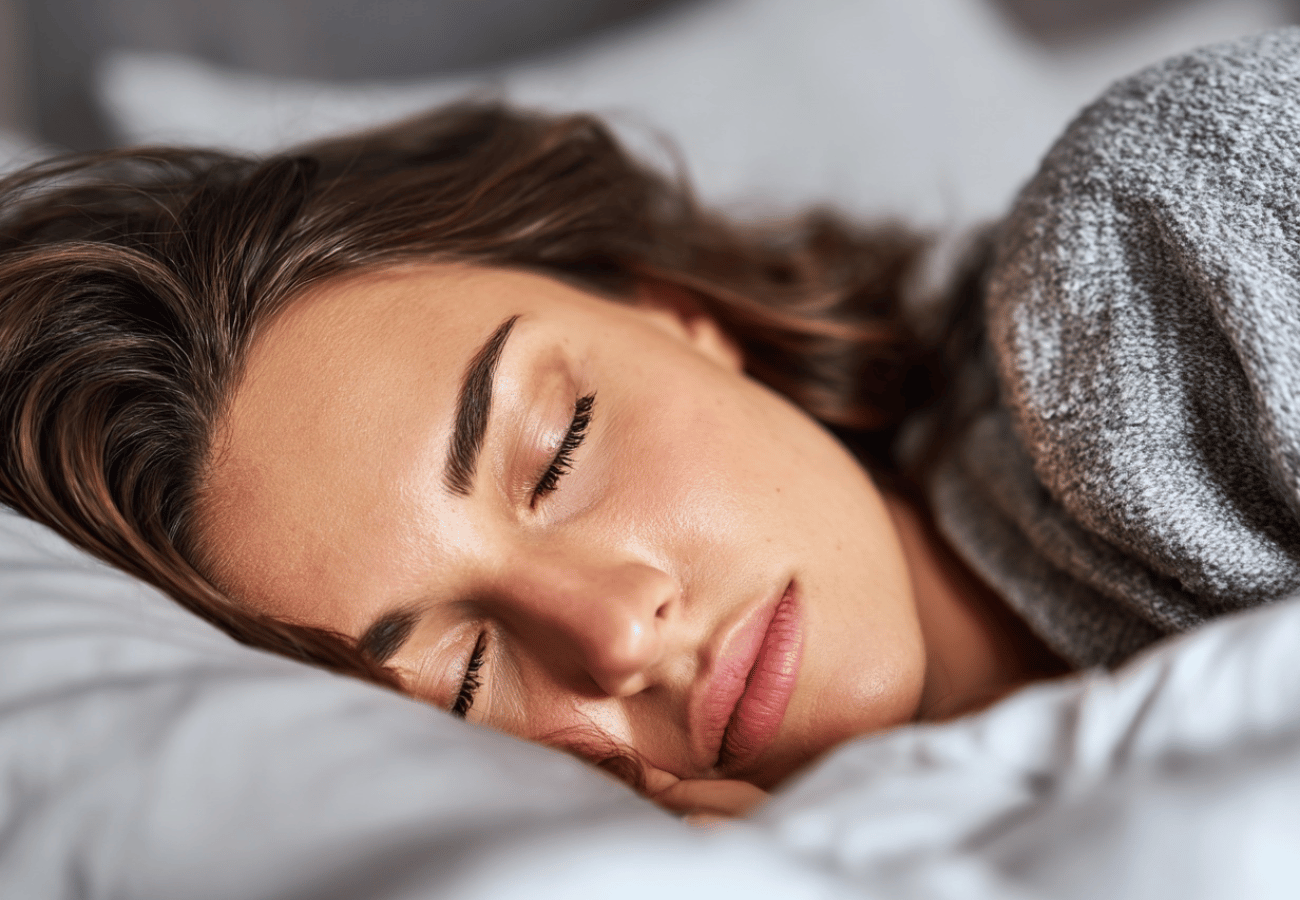Take One Spoonful Before Bed and Fall Asleep Instantly — Wake Up Refreshed 🌙
Meta Description: Discover natural sleep remedies that help you fall asleep fast and wake up refreshed. Simple bedtime tricks for better sleep quality tonight.
Introduction: The Nightly Struggle Millions Face
If you’ve ever found yourself staring at the ceiling at 2 AM, watching the hours tick by while desperately trying to fall asleep, you’re not alone. Nearly one in three adults struggles with occasional insomnia, and millions more battle chronic sleep disturbances that leave them exhausted, irritable, and unable to function at their best.
The promise of falling asleep instantly might sound too good to be true, but nature has provided us with powerful remedies that can significantly improve sleep quality without the need for prescription medications. In this comprehensive guide, we’ll explore evidence-based natural sleep remedies, focusing on a surprisingly simple bedtime ritual that has helped countless people transition from restless nights to restorative sleep.
Whether you’re dealing with occasional sleeplessness or chronic insomnia, these healthy sleep habits and natural approaches can transform your nights and help you wake up refreshed, energized, and ready to tackle your day.
Understanding Why We Struggle to Sleep
Before diving into solutions, it’s essential to understand what keeps us awake. Sleep disturbances rarely happen without reason, and identifying the underlying causes is the first step toward lasting improvement.
Common Causes of Sleep Problems
Stress and Anxiety
Mental stress is the number one sleep disruptor in modern society. When your mind races with worries about work, relationships, or finances, your body remains in a state of heightened alertness, making it nearly impossible to relax into sleep. The stress hormone cortisol, which should naturally decrease in the evening, remains elevated, blocking the production of melatonin, your body’s natural sleep hormone.
Poor Sleep Hygiene
Many sleep problems stem from habits we’ve unknowingly developed. Irregular sleep schedules, late-night screen time, consuming caffeine or heavy meals before bed, and sleeping in an uncomfortable environment all contribute to poor sleep quality. Your bedroom temperature, lighting, and noise levels play crucial roles in whether you fall asleep fast or toss and turn for hours.
Nutritional Deficiencies
Your diet directly impacts your sleep. Deficiencies in magnesium, vitamin D, B vitamins, and certain amino acids can interfere with your body’s ability to produce sleep-regulating neurotransmitters like serotonin and melatonin.
Medical Conditions
Conditions such as sleep apnea, restless leg syndrome, chronic pain, hormonal imbalances, and digestive issues can severely impact sleep quality. If you consistently struggle to stay asleep naturally or experience excessive daytime fatigue, consulting a healthcare provider is essential.
The One-Spoonful Sleep Solution: What Is It?
The remedy gaining attention from sleep experts and natural health practitioners is surprisingly simple: raw honey combined with a pinch of pink Himalayan salt. This powerful combination addresses multiple sleep disruptors simultaneously and provides your body with exactly what it needs to transition into deep, restorative sleep.
How This Natural Sleep Remedy Works
The Science Behind Honey and Salt
When consumed together before bed, raw honey and salt create a metabolic environment that promotes sleep. Here’s the breakdown:
Raw honey provides glucose that helps your liver produce glycogen, ensuring stable blood sugar throughout the night. When blood sugar drops during sleep, your body releases stress hormones like cortisol and adrenaline, which can jolt you awake. By maintaining stable glucose levels, honey prevents these midnight wake-ups.
The small amount of salt provides essential minerals, particularly sodium, which helps reduce cortisol production and supports proper fluid balance. Salt also aids in the production of serotonin, a neurotransmitter that converts to melatonin, your natural sleep hormone.
Additional Benefits
This combination also supports optimal brain function during sleep. Your brain requires significant energy during rest for memory consolidation, cellular repair, and toxin removal. The sustained energy from honey ensures these critical processes occur without interruption.
How to Use the One-Spoonful Method
The Basic Recipe
Ingredients:
- 1 teaspoon of raw, unfiltered honey
- A tiny pinch of pink Himalayan salt or natural sea salt (about 1/8 teaspoon)
Instructions:
- Mix the honey and salt together in a small dish
- Take this mixture approximately 30 minutes before your desired bedtime
- Let it dissolve slowly under your tongue or swallow it with a small amount of water
- Avoid eating or drinking anything else afterward, except plain water if needed
Best Practices for Maximum Effectiveness
Start with this basic recipe and adjust according to your body’s response. Some people find taking it directly before lying down works best, while others prefer the 30-minute window. The key is consistency—use this remedy nightly for at least two weeks to experience the full benefits.
Always use raw, unprocessed honey and natural salt. Processed versions lack the beneficial enzymes, minerals, and nutrients that make this remedy effective.
10 Additional Natural Sleep Remedies to Improve Sleep Quality
While the honey-salt combination is powerful, combining it with other natural approaches creates a comprehensive strategy for better sleep.
1. Establish a Consistent Sleep Schedule
Your body operates on a circadian rhythm—an internal clock that regulates sleep-wake cycles. Going to bed and waking up at the same time every day, even on weekends, reinforces this natural rhythm. Consistency signals your brain when it’s time to produce sleep hormones and when to increase alertness.
2. Create a Bedtime Relaxation Routine
Develop a calming pre-sleep ritual that signals your body it’s time to wind down. This might include:
- Taking a warm bath with Epsom salts
- Reading a physical book (not on screens)
- Gentle stretching or restorative yoga
- Practicing deep breathing exercises
- Listening to calming music or nature sounds
3. Optimize Your Sleep Environment
Transform your bedroom into a sleep sanctuary. Keep the room temperature between 60-67°F (15-19°C), which research shows is optimal for sleep. Use blackout curtains or an eye mask to eliminate light, and consider white noise machines to mask disruptive sounds.
4. Try Herbal Teas
Certain herbal teas have proven sleep-promoting properties:
- Chamomile tea contains apigenin, an antioxidant that binds to brain receptors promoting sleepiness
- Valerian root tea has been used for centuries as a natural sedative
- Passionflower tea increases GABA in the brain, reducing anxiety and promoting calm
- Lavender tea has mild sedative effects and reduces anxiety
Drink these teas 30-60 minutes before bed as part of your bedtime relaxation routine.
5. Practice the 4-7-8 Breathing Technique
This powerful breathing method activates your parasympathetic nervous system, signaling your body to relax:
- Exhale completely through your mouth
- Close your mouth and inhale through your nose for 4 counts
- Hold your breath for 7 counts
- Exhale completely through your mouth for 8 counts
- Repeat this cycle 4 times
This technique is particularly effective as an instant sleep trick when you’re already in bed but can’t seem to drift off.
6. Supplement with Magnesium
Magnesium deficiency is extremely common and directly linked to poor sleep. This essential mineral regulates neurotransmitters that calm the nervous system and prepare your body for sleep. Consider taking 200-400mg of magnesium glycinate or magnesium citrate 1-2 hours before bed. Foods rich in magnesium include pumpkin seeds, almonds, spinach, and dark chocolate.
7. Limit Blue Light Exposure
Electronic devices emit blue light that suppresses melatonin production. Implement a “digital sunset” by turning off screens at least one hour before bed. If you must use devices, enable night mode settings or wear blue-light-blocking glasses.
8. Exercise Regularly (But Time It Right)
Regular physical activity significantly improves sleep quality and helps you stay asleep naturally. However, timing matters. Vigorous exercise increases cortisol and body temperature, which can interfere with sleep if done too close to bedtime. Aim to finish intense workouts at least 3-4 hours before sleep, though gentle activities like yoga or walking can be done closer to bedtime.
9. Mind Your Meals
What and when you eat impacts sleep quality. Avoid heavy meals within 3 hours of bedtime, as digestion can interfere with sleep. However, going to bed hungry also disrupts sleep. If needed, have a light snack that combines complex carbohydrates with protein, such as a small piece of whole-grain toast with almond butter.
10. Use Aromatherapy
Certain scents promote relaxation and sleep. Lavender essential oil is particularly well-researched for its calming properties. Other beneficial scents include bergamot, cedarwood, and ylang-ylang. Use a diffuser, apply diluted oils to your pillow, or add a few drops to your evening bath.
Healthy Sleep Habits: Building a Foundation for Better Rest
Beyond specific remedies, cultivating healthy sleep habits creates a foundation for consistently good sleep.
The Importance of Sleep Hygiene
Sleep hygiene refers to the behaviors and environmental factors that promote quality sleep. Poor sleep hygiene is often the root cause of chronic sleep problems, and improving it can dramatically enhance your ability to fall asleep fast and wake up refreshed.
Reserve Your Bed for Sleep Only
Train your brain to associate your bed with sleep by avoiding work, eating, or watching TV in bed. This classical conditioning helps your body automatically prepare for sleep when you lie down.
Get Morning Sunlight
Exposure to bright light in the morning helps regulate your circadian rhythm by suppressing melatonin and increasing alertness. Spend 10-15 minutes outside within an hour of waking, or sit near a bright window.
Watch Your Caffeine Intake
Caffeine has a half-life of 5-6 hours, meaning half the amount you consume remains in your system hours later. If you’re sensitive to caffeine, avoid it after noon. Consider switching to herbal tea in the afternoon and evening.
Manage Stress Throughout the Day
Stress management isn’t just a bedtime activity. Practice stress-reduction techniques throughout your day—meditation, journaling, regular breaks, and setting boundaries all contribute to lower nighttime anxiety and better sleep.
When to Seek Professional Help
While natural remedies work wonderfully for many people, persistent sleep problems sometimes require medical attention. Consult a healthcare provider if you experience:
- Chronic insomnia lasting more than three months
- Loud snoring accompanied by gasping or pauses in breathing
- Excessive daytime sleepiness despite adequate sleep time
- Difficulty staying awake during routine activities
- Persistent feelings of unrefreshing sleep
- Unusual behaviors during sleep (sleepwalking, sleep talking, or acting out dreams)
These symptoms could indicate sleep disorders like sleep apnea, restless leg syndrome, or narcolepsy that require professional diagnosis and treatment.
Conclusion: Your Path to Better Sleep Starts Tonight
Achieving restful, restorative sleep doesn’t require expensive medications or complicated protocols. By implementing the simple honey-salt remedy alongside evidence-based bedtime relaxation tips and healthy sleep habits, you can naturally improve your sleep quality and wake up refreshed every morning.



